Did you know that some countries in Latin America can be seen as pioneers in SPP? Please have a look at the case of Sao Paulo in Brazil and Chile.
Interested to learn about how bundling of procurement happens in some German cities, and how this helps to support SPP? -> Monika Schmidt
Did you know that communication between public procurers and possible bidders is permitted in the European legal framework? Why it is a useful instrument and which options exist can be found in the presentation by Tim Stoffel and the summary of his talk.
Region Stockholm, a cooperation body of 26 municipalities has developed instruments to introduce increasingly ambitious sustainability criteria for ICT products without overburdening the potential suppliers. If you want to learn more about this, please have a look at the presentation by Kathleen McCaughey and the summary of her speech. Similarly, the example of Electronics Watch can show, how resources can effectively be shared among stakeholders in order to monitor social compliance among shared ICT value chain. Please refer to the summary of speech by Björn Claeson.
Public entities buying food from small-scale farmers e.g. for schools can contribute to make food systems more sustainable. FAO supports related endeavours both on the side of public procurers and small-holder farmers systems in developing countries -> Pilar Santacoloma. The presentation by Luana Swensson, also from FAO and the summary of her speech provides more information on public food procurement for school feeding programs. How public food procurement can impact on a whole agricultural region was shown by Betina Bergmann Madsen from the city of Copenhagen in her speech.
Bidder dialogues are rather advances modes of interaction between public procurers and potential bidders, sometimes involving also representatives from civil society. The presentation by Josefine Hintz from ICLEI and the summary of her speech can give you an idea of how cities in the Netherlands and Scandinavia use this instrument effectively for the procurement of ICT hardware and mobile phones. How the city of Bonn has applied bidders dialogues for the procurement of sustainable uniforms for their parks’ department was explained by Christoph Bartscher.
How public procurement can contribute to territorial cohesion and promotion of small companies can be demonstrated by the French investment fund Impact Partners. You can find crucial information in the presentation by Caroline Niemeier and the summary of her speech.
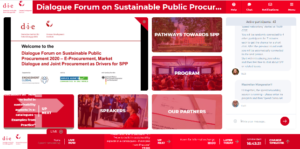
From 26-28 October 2020, the German Development Institute / Deutsches Institut für Entwicklungspolitik (DIE), in cooperation with the Service Agency Communities in One World (SKEW), welcomed more than 140 international experts to a virtual dialogue on sustainable public procurement. The inclusion of sustainability criteria in public tenders is considered one of the biggest potential drivers of sustainable consumption and production patterns in the sense of SDG 12 of the 2030 Agenda for Sustainable Development. In practice, sustainable procurement needs to be linked to instruments of a professional public procurement system.
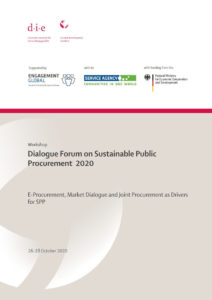
The participants exchanged views on three currently much-discussed instruments, the use of electronic procurement platforms (e-procurement), various dialogue formats with market actors and the bundling of demand in purchasing groups. During the first day of the event, experts such as André Siedenberg (Kopart) and Tumelo Ntlaba (National Treasury South Africa) discussed ways of taking sustainability criteria into account in electronic purchasing platforms. On those platforms, ordering sustainable products and services should be made as easy as possible for end users in municipalities. The exchange between the public sector and „the market“, i.e. retailers, manufacturers and certification organizations, was the main topic of the second event day. Christian Gusbeth (Procurement Office of the Federal Ministry of the Interior) and Kathleen McCaughey (Region Stockholm) drew attention to the key advantages for both sides: Through exchange with the market, the public entities find out which criteria they can demand currently and prepare market participants for new ambitious criteria in the future. On the other hand, companies would be able to plan production capacities and modalities better. On the last day of the Dialogue Forum, the participants focused on bundling demand in purchasing groups. Gisele Duarte Doetzer, manager of Brazil’s largest network on sustainable procurement (Sustenta Paraná), drew attention to the many positive consequences of demand pooling for the fulfilment of the SDGs. Due to the bundling of knowledge and buyer power, purchasing groups can often serve all sustainability dimensions more effectively than traditional individual procurement across multiple procuring authorities.
This year’s Dialogue Forum has clearly shown that sustainable and professional procurement have a positive influence on each other and should be approached in an integrated manner. This will enable public procurement to respond more effectively to both short-term challenges such as the current Corona crisis and long-term challenges such as climate change. Policy-makers are called upon to ensure that support institutions are able to provide public authorities with effective and holistic guidance on sustainable and professional procurement.
Day 1 – Monday, 26 October 2020
Day 2 – Tuesday, 27 October 2020
Day 3 – Wednesday, 28 October 2020
Day 1 – Monday, 26 October 2020
Day one of this year’s Dialogue Forum on Sustainable Public Procurement focused on electronic catalogues as a tool for effective strategic and sustainable procurement. Digitization of procedures in public administration (e-government) is advancing fast. In this regard, some countries in Latin America and Africa are ahead of Germany, providing unique opportunities for South-North learning. Procurement is also in an accelerated transition to digitized formats (e-procurement). One crucial element of e-procurement are electronic catalogues from which public entities can buy the products and services they need for their own functioning and for providing services to their constituencies in fields like education, health, infrastructure or public housing, etc. E-Procurement and electronic catalogues are also an important entry point for strategic and sustainable public procurement. One fear of public procurers and decision makers in the administration is that costs for public procurement will rise, when ecological and social performance criteria are applied. Evidence shows clearly, that the savings which can be achieved by transitioning to e-procurement are very significant, thus making value-for-money considerations more compatible with higher performance criteria related to the sustainability of products to be procured.
Welcome Notes
The Forum started with welcome notes by Imme Scholz, Deputy Director at the German Development Institute / Deutsches Institut für Entwicklungspolitik (DIE), Felix Reifschneider of the Federal Ministry for Economic Cooperation and Development (BMZ) and Jeanette Schade of the Service Agency Communities in One World (SKEW).
Imme Scholz pointed out that sustainable public procurement has the potential to be an incentive for more sustainable business conduct and is also an example for learning from local governments. In order to fulfil this potential, this has to be brought increasingly to the attention of state and federal governments. Felix Reifschneider pointed out the importance of the topic and highlighted the ministries’ engagement with policy instruments that promote sustainable and especially responsible business conduct, such as the Green Button (Grüner Knopf) and drafts for a Due Diligence law. Jeanette Schade underlined the important role that municipalities have in making fair public procurement a reality and the importance of cooperation like the one between DIE and SKEW to understand the opportunities and challenges of the topic and to connect actors in order to promote implementation.
Panel debate on “The multidimensionality of sustainability – Different dimensions of sustainability in e-catalogues for different country contexts?”
A socio-eco label as part of e-catalogues in Sao Paulo, Brazil
- Denize Coelho Cavalcanti, Secretariat of Environment, State of São Paulo
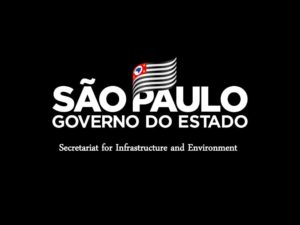
The Brazilian State of Sao Paulo is an international pioneer in SPP. It was a member of the United Nations “Marrakech Task Force” from the beginning in 2003. In 2008 the SPP State Program was approved. E-Procurement Solutions are implemented to assure agility, transparency and compliance. Already in 2000, an electronic platform for matching demand by public entities and the offer from the private sector was established. The number of transaction and of traded goods has been increasing permanently, reaching a total of nearly 900.000 transactions carried out and nearly 900.000 items traded until November 2020. The electronic platform allows public procurers to procure prothe fiducts and services with social and environmental criteria with technical specification and/or contract clauses. The platform includes products with a socio-eco label to identify such products, that was set up in 2005 already. Thus working as a tool for the public purchasers and making easier for them to choose products and services with reduced negative impact and define sustainability requirements for suppliers. Such requirements are, for example saving of water and energy, rational use of raw materials and reduction of waste in their process as well as social criteria.
Integration of social aspects in catalogues in South Africa
- Tumelo Ntlaba, Head of Supply Chain Management ICT unit, National Treasury South Africa
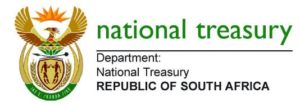 In South Africa, the social dimension of sustainability is overwhelmingly predominant. Specifically, procurement focusses on promoting small and microenterprises, on developing skills and promoting employment, and also on what is known as Black Economic Empowerment, which is a policy that aims to redress historic disadvantages through awarding points for black-owned businesses, as well as female, disability, location and youth-owned attributes. In writing the specifications and award criteria for framework for “transversal” contracts, these dimensions are considered, and the public entities that call off contracts from these frameworks are also expected to privilege those aspects. These attributes are not however shown within e-catalogues, which are focussed on products. So unlike within the EU, the companies themselves and their owners are the focus of sustainability criteria, rather than the products which are the subject matter of the tender. Tumelo Ntlaba also explored the tensions between requiring high standards of verification, and the desire to privilege small businesses.
In South Africa, the social dimension of sustainability is overwhelmingly predominant. Specifically, procurement focusses on promoting small and microenterprises, on developing skills and promoting employment, and also on what is known as Black Economic Empowerment, which is a policy that aims to redress historic disadvantages through awarding points for black-owned businesses, as well as female, disability, location and youth-owned attributes. In writing the specifications and award criteria for framework for “transversal” contracts, these dimensions are considered, and the public entities that call off contracts from these frameworks are also expected to privilege those aspects. These attributes are not however shown within e-catalogues, which are focussed on products. So unlike within the EU, the companies themselves and their owners are the focus of sustainability criteria, rather than the products which are the subject matter of the tender. Tumelo Ntlaba also explored the tensions between requiring high standards of verification, and the desire to privilege small businesses.
Sustainability criteria in some German e-catalogues
- André Siedenberg, KoPart andKommunal Agentur NRW
 KoPart is an institutionalized cooperation where municipalities of North Rhine-Westphalia, Germany, can join in to procure different goods for which the organization implemented an e-catalogue system. They mostly procure c-articles, which are articles for single use like toilet paper, but in the current situation also procure articles for digitalization like tablet computers.
KoPart is an institutionalized cooperation where municipalities of North Rhine-Westphalia, Germany, can join in to procure different goods for which the organization implemented an e-catalogue system. They mostly procure c-articles, which are articles for single use like toilet paper, but in the current situation also procure articles for digitalization like tablet computers.
Sustainability criteria are integrated into the system by using a traffic light system where green is refers to low and red to low sustainability standards, highlighting sustainable products in the catalogue. The information whether an article is sustainable or not is delivered by the supplier. In that matter, Kopart highly relies on self-declaration by the bidders during the bidding process or the suppliers. They also check the self-declarations through labels which are included in the European label framework.
KoPart not only integrates sustainability criteria into the e-catalogue but also into the procedure. In line with European and German law, companies who work mainly with disabled people can apply for contracts with a price that is up to 15 % higher than the other prices in the procedure. In addition, contracts are divided into small lots to give small and medium enterprises a fair chance in the bidding process.
Presentations and discussion on “How to build in sustainability aspects in e-catalogues –Examples from Practice”
Panellists: Claudio Loyola, Consultant to the Inter-American Network on Government Procurement, INGP, Tumelo Ntlaba, Head of Supply Chain Management ICT unit, National Treasury South Africa, Monika Schmidt, Chairwoman of the Supervisory Board, TEK Service AG
Following on from the first panel, the second session exhibited diverse practical implementations of SPP in e-catalogues – in both governmental and intergovernmental settings. Panellists from three continents shared inspiring examples from their own practice on the two key questions of the first day of the conference: “How to increase the quantity of sustainable goods and services in e-catalogues?” and “How to enable the procurer who orders goods from such catalogues to choose more sustainable products?” This led to a rare exchange across continents on an issue that is increasingly important to public procurement.
Catálogos electrónicos y compras sostenibles
- Claudio Loyola, Consultant to the Inter-American Network on Government Procurement, INGP
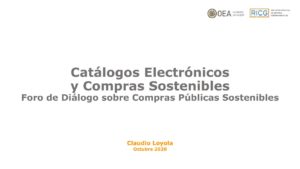
Chile is one of the pioneers of SPP in Latin America. Since 2006, the country has received technical support for its SPP policies by UNEP in the frame of the Marrakech Task Force on Sustainable Public Procurement. ChileCompra is the entity of the government in charge of managing the system of public procurement in the country. It was established as a division of the Finance Ministry in 2003, as part of the modernization of public administration. To buy and contract what they need, entities use ChileCompra’s transactional platform, www.mercadopublico.cl, which brings together in one place the demand of public buyers and the supply of thousands of businesses. To make public procurement even more efficient, some new modalities of transaction include centralized and coordinated procurement, new forms of framework agreements, shared services, etc. What is important is that the platform mercadopublico.cl allows to identify around 120.000 products classified as “sustainable”. Also, the around 5.000 companies are evaluated for their ethical behaviour. Public buyers may give preference for small companies or women-owned enterprises. The platform includes sustainability-related labels, such as “Sello Empresa Mujer” (Women’s Business Label). The Interamerican Network of Government Procurement is currently exploring the opportunity to facilitate participation of companies with triple positive impact: economic, social and environmental in public procurement.
BuySite integrates many social aspects into a nationwide e-catalogue in South Africa
- Tumelo Ntlaba, Head of Supply Chain Management ICT unit, National Treasury South Africa
 South Africa is a leader in the use of e-catalogues, alongside the use of framework contracts to drive SPP objectives. The South African national treasury has started to standardise the list of services procured through all government institutions via the mechanism of framework or ‘transversal’ contracts, standardised cataloguing and a transactional platform called the BuySite. The National Treasury maintains over 60 different contracts, covering over 15,000 items from medical goods to vehicles and uniforms. Their framework contracts award extra points to women, black, youth or people with disabilities-owned businesses, businesses owned by people in rural or underdeveloped areas, and also promote youth employment and ‘Broad Based Black Economic Empowerment.’ Their e-catalogue BuySite enables users to search for products which have those categorisations in the system, enabling users of the framework contracts to purchase in a socially responsible way. The system also allows politicians to assess the levels of spending that incorporate SPP objectives, as well as to keep track on the goods procured – which is also helpful in cases of responses to natural disasters, such as a pademic for example. The Treasury intends to adopt more environmental categorisations in the future.
South Africa is a leader in the use of e-catalogues, alongside the use of framework contracts to drive SPP objectives. The South African national treasury has started to standardise the list of services procured through all government institutions via the mechanism of framework or ‘transversal’ contracts, standardised cataloguing and a transactional platform called the BuySite. The National Treasury maintains over 60 different contracts, covering over 15,000 items from medical goods to vehicles and uniforms. Their framework contracts award extra points to women, black, youth or people with disabilities-owned businesses, businesses owned by people in rural or underdeveloped areas, and also promote youth employment and ‘Broad Based Black Economic Empowerment.’ Their e-catalogue BuySite enables users to search for products which have those categorisations in the system, enabling users of the framework contracts to purchase in a socially responsible way. The system also allows politicians to assess the levels of spending that incorporate SPP objectives, as well as to keep track on the goods procured – which is also helpful in cases of responses to natural disasters, such as a pademic for example. The Treasury intends to adopt more environmental categorisations in the future.
Sustainability in public sector purchasing. „Good practice“ of local authorities: Erfurt, Groß Gerau, Mainz & Tübingen
- Monika Schmidt, Chairwoman of the Supervisory Board, TEK Service AG
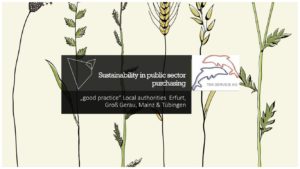
The TEK Service AG provides e-cataloguing for a number of public authorities in Germany. The bundling effect of the electronic platform becomes obvious in the case of four cities that joined together to use one e-catalogue. Sustainability already plays a central role, as it can be shown by the fact that a significant number of items accessible via the e-catalogue is already certified by at least one certification scheme or body.
Monika Schmidt showed that e-cataloguing meets general business objectives – increasing transparency, reducing administration needs and therefore saving money. Over the last 6-10 years there has been an increase in dynamic collaboration and innovation in utilising framework contracts and e-catalogues to achieve SPP objectives of all kinds through combining spending leverage across the four public authorities. TEK had been able to utilise e-cataloguing to replace Amazon orders with a collective ‘shopfront’ of the many local bookstores. Sustainability criteria can easily be included in public procurement, assisted by electronic catalogues. Preconditions for this are that the institution’s (city’s) administration has a good grip on the relevant information, such as statistics, or information about the suppliers, including their contract conditions and range of products. If the purchasing department effectively controls the procurement process between public buyers and suppliers, bundling effects and purchasing cooperation become possible. Aspects of sustainability and the desired regional dimension of the supply chains can be integrated into the purchasing strategy. Also, local companies, such as bakeries or book stores, can be included.
During questions, participants brought up an important point: Certificates are useful for evaluating the level of sustainability in e-catalogues, but procurers are then reliant on the quality of that certification, and in some cases, certifications are not available for a specific product or country of origin. In such cases it is crucial to make use of international certification organisations which are experts in particular industries or products. To heavily rely on certifications in sustainable public procurement can also exclude smaller suppliers and create barriers to entry. Public authorities may need to diversify their approaches to verifying sustainability criteria in public tenders. Additionally, it might be beneficial if governments cover some costs of standard setting that smaller suppliers would otherwise be unable to absorb.
<
Day 2 – Tuesday, 27 October 2020
The second day of the conference explored different forms of interaction between public entities and the market, such as market exploration or bidder dialogues. Participants explored the potential benefits and pitfalls of such exchanges, discussing the limits and the possibilities. Panels and participants provided insights into how actors can use different types of interaction with the market to strengthen the sustainability aspects within tenders. The day brought together a diverse array of practitioners who shared their views on different instruments of public-market interaction in the different phases of the tendering process, i.e. from market exploration to contract management.
Presentation on “Interaction with the market in public procurement –Different forms and their potential for SPP”
Communication with the market on social responsible public procurement: Increasing the success of integrating sustainability criteria in public tenders
- Tim Stoffel, German Development Institute / Deutsches Institut für Entwicklungspolitik (DIE)
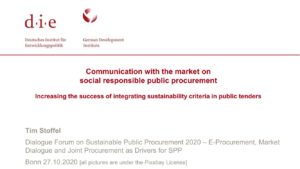
The first presentation by Tim Stoffel was an overview of different methods and tools used by public buyers to interact with the market in order to achieve SPP goals.
Can buyers communicate with the market? Despite many misconceptions and misgivings within the public procurement profession, especially in Germany, public buyers can legally use communication with the market to pursue SPP objectives. For example, within the European Union, it has been clarified that as long as fair and equal treatment of all market actors is provided, most forms of market communication are permissible and making use of them would result in considerable gains as regards sustainable public procurement.
Should buyers communicate with the market? The theory behind market communication for public buyers is to leverage public demand in order to increase the production of more sustainable goods and incentivize companies to pursue more sustainable conduct in their operations. In practice this is challenging, especially when sustainable goods are not already available on the market. Because of the length and complexity of public procurement processes, it is harder for public buyers to make requirements that are not already catered for by existing suppliers and their ways of production. The challenge of procuring sustainably depends on the product – with simple products such as Fairtrade coffee already being well covered by existing certifications, but complex products like ICT, or school meals having complex and varied supply chains stretching over the world. In addition, products are most often not completely sustainable. Therefore, sustainable public procurement is not a simple exercise of ticking boxes on tender documents, but needs ongoing effort and has to be adapted over time – it is an ongoing process.
Ultimately however, requirements for sustainability are essentially the same as other requirements, and they therefore benefit from higher levels of communication between buyers and the market. On the supply side, it is useful for actors to communicate what is actually possible, and what are the practical limits to sustainable production and verification that a purchaser might need to know about in order to adjust their tender accordingly. On the demand side, increased communication helps suppliers understand the wider sustainability and strategic objectives that underlie particular tender requirements, and apply innovation to meet those objectives.
How can public buyers communicate with the market? Public buyers can use a variety of forms of market communication, corresponding to the stages of the procurement process. Market exploration during the pre-tender phase can be used to communicate needs to suppliers. This type of communication can inform which requirements to make mandatory and which not in a particular tender – retaining flexibility in the capacity of the market to deliver at a given time. The tender phase is itself a communication opportunity for sustainability requirements. After contract conclusion, contract management facilitates close two-way communication and engagement with the complexities of delivering sustainable products and services. Two key tools that are increasingly being used are pre-tender bidder dialogues, and contract management. Combining and increasing the use of such tools for communication with the market can support both sides in reaching more social and ecological criteria in public procurement.
Panel debate on “What can we achieve by communicating with the market?”
Panellists: Kathleen McCaughey, Manager Sustainable Supply Chains, Region Stockholm, Björn Claeson, Director, Electronics Watch, Pilar Santacoloma, Agri-food Systems Officer, Food and Agriculture Organization of the United Nations
The panel presentation looked in detail at a number of different approaches towards communicating with the market. Particularly it explored the question of what such approaches could achieve. The panel brought together participants from different countries and different sectors who use a variety of methods to communicate with and influence the market.
Region Stockholm: Market dialogue – an example from ICT-procurement
- Kathleen McCaughey, Manager Sustainable Supply Chains, Region Stockholm
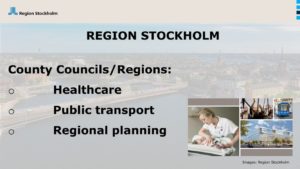
Region Stockholm – consisting of 26 municipalities in and around the city of Stockholm, and responsible for healthcare, transport and building planning in that region – aims to be Europe’s leader in sustainable public procurement of ICT products. To achieve this high ambition, they continually communicate with their suppliers, who know their own supply chains best, but in addition to this, also seek independent sources of information and verification, to be aware of social hot spots in their supply chains. Through market communication, Region Stockholm is able to amend the award criteria and the technical specifications according to the capacity of the market to satisfy those criteria.
Public buyers can promote SPP through introducing a new sustainability requirement even before all actors in the market are able to meet it. As long as 50-60% of the market operators can comply with the new requirement, it is worth putting it in place. Another tool is the use of award criteria for sustainability requirements that very few or no operators can currently deliver. Thus, by incentivising SPP innovations via award criteria, operators develop their capacities to deliver it in the next tender in order to gain an edge over the competition. Region Stockholm applies a very engaged process of market engagement, from large group sessions to one-on-one sessions, pre-warning and engaging with the whole market about new SPP criteria. After contracts have been awarded, they build capacity with their supplier base over the long term, helping them to develop over time. Region Stockholm’s example made clear the virtues, from an SPP perspective, of consolidation of public service provision and spending within particular areas. Such consolidation provides more leverage and can facilitate pooling of capacity to engage with the markets.
Collective action on sustainable public procurement of ICT through Electronics Watch
- Björn Claeson, Director, Electronics Watch
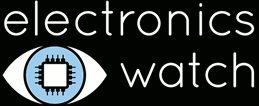 Electronics Watch is an innovative alliance made up of public sector entities – governments, local authorities, transport authorities, health bodies, and universities for example – who collectively pool resources to monitor their ICT supply chains (a key category for public buyers) for social standards. Electronics Watch then helps those entities collectively engage with their shared suppliers in order to address violations of social contract conditions within their shared supply chains. Electronics Watch works with trusted, independent civil society monitors based near regions of production in the countries that make up the global electronics supply chain, who are able to independently investigate issues that are presented by workers in public sector supply chains. This is called ‘worker driven monitoring’. Electronics Watch is now a network of 330 public sector organisations, and 11 civil society monitoring organisations. Electronics Watch overcomes the ‘collective action problem’ that public entities face in resourcing their own supply chain monitoring. Every supply chain has its own complexities in terms of SPP, and there will never be enough resources for each public entity to monitor and enforce social and environmental standards over all of theirs. By pooling these resources, and drawing on Electronics Watch’s network of monitors, public buyers can in effect collectively outsource this market communication and some of the contract management, and put their strengths together to influence this vast industry. Electronics Watch demonstrates that spending influence can be combined across localities, and across national borders – reflecting the global nature of the industries the public sector aims to influence.
Electronics Watch is an innovative alliance made up of public sector entities – governments, local authorities, transport authorities, health bodies, and universities for example – who collectively pool resources to monitor their ICT supply chains (a key category for public buyers) for social standards. Electronics Watch then helps those entities collectively engage with their shared suppliers in order to address violations of social contract conditions within their shared supply chains. Electronics Watch works with trusted, independent civil society monitors based near regions of production in the countries that make up the global electronics supply chain, who are able to independently investigate issues that are presented by workers in public sector supply chains. This is called ‘worker driven monitoring’. Electronics Watch is now a network of 330 public sector organisations, and 11 civil society monitoring organisations. Electronics Watch overcomes the ‘collective action problem’ that public entities face in resourcing their own supply chain monitoring. Every supply chain has its own complexities in terms of SPP, and there will never be enough resources for each public entity to monitor and enforce social and environmental standards over all of theirs. By pooling these resources, and drawing on Electronics Watch’s network of monitors, public buyers can in effect collectively outsource this market communication and some of the contract management, and put their strengths together to influence this vast industry. Electronics Watch demonstrates that spending influence can be combined across localities, and across national borders – reflecting the global nature of the industries the public sector aims to influence.
Communicating with small scale farmers about public procurement
- Pilar Santacoloma, Agri-food Systems Officer, Food and Agriculture Organization of the United Nations
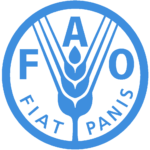 Food and Agriculture Organization. In Latin American countries, what started out as public procurement of food for school feeding programmes, evolved to support the development of small-scale farmers and local food markets. These small-scale producers have particular needs in terms of market engagement. Unlike large agricultural companies, they are unlikely to know the rules and procedures of public procurement. This led to government buyers responding with innovative forms of market communication, including the use of radio and of local networks through extension officers. These officers explain the possibilities of public procurement to farmers whilst reporting back what those farmers need in order to take part. The FAO is involved in supporting the supply and demand side of the market. In each country governments must integrate key criteria for the process to be open to small farmers, including elements of preferential treatment, sustainability criteria, etc. The FAO also supports small scale producers with capacity development and guidance to engage with those tenders. In this sense farmers are not simply selling products into the school feeding programmes, but are partners within those programmes. The role of governments and bodies like the FAO is to coordinate networks of stakeholders.
Food and Agriculture Organization. In Latin American countries, what started out as public procurement of food for school feeding programmes, evolved to support the development of small-scale farmers and local food markets. These small-scale producers have particular needs in terms of market engagement. Unlike large agricultural companies, they are unlikely to know the rules and procedures of public procurement. This led to government buyers responding with innovative forms of market communication, including the use of radio and of local networks through extension officers. These officers explain the possibilities of public procurement to farmers whilst reporting back what those farmers need in order to take part. The FAO is involved in supporting the supply and demand side of the market. In each country governments must integrate key criteria for the process to be open to small farmers, including elements of preferential treatment, sustainability criteria, etc. The FAO also supports small scale producers with capacity development and guidance to engage with those tenders. In this sense farmers are not simply selling products into the school feeding programmes, but are partners within those programmes. The role of governments and bodies like the FAO is to coordinate networks of stakeholders.
Breakout session 1: Bidder Dialogues as a tool for close communication with the market
This session focused specifically on a powerful tool for engagement with all of a public buyers’ existing and potential suppliers – the bidder dialogue. Bidder dialogues are often held prior to a tender being published. Bidder dialogues are a way for public entities to communicate their needs to the market, and to understand the extent to which a sufficient number of the prospective suppliers will be able to meet those needs. In the case of sustainable procurement, this is particularly important, as public buyers may need to communicate requirements that their suppliers had not considered previously. In this scenario, talking to suppliers en masse, can ensure that they fully understand the sustainability criteria that are being introduced and can showcase their compliance in their bids or are able to develop production and sourcing methods to meet those new criteria. Bidder dialogues can be used to stimulate innovation across a whole market, or create new forms of production and distribution.
Engage to change: Bidder dialogues as a tool for close communication with the market
- Josefine Hintz, Officer Sustainable Economy and Procurement, ICLEI -Local Governments for Sustainability
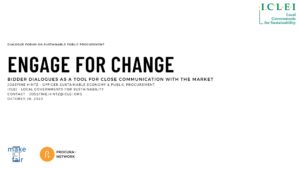
Josefine Hintz from ICLEI, a global network of more than 1,750 local and regional governments committed to sustainable development, presented an experience of a major bidder dialogue session undertaken by the city of Haarlem in The Netherlands, on behalf of a network of cities. The recent revisions to the European procurement legislation have helped to demonstrate that there is legal space for these dialogues. With 80 industry representatives attending two events, the city presented its wider sustainability ambitions, alongside the social criteria planned for a specific forthcoming ICT tender. Methods that were used to undertake the dialogue included a ‘world café’, a round table, a keynote sustainability speaker. This was followed by a themed Q&A based on questions previously sent to the suppliers in attendance. Unexpectedly for Haarlem, the suppliers present said that not only could they deliver on the social criteria requirements, but they could also provide the products as a ‘hardware as a service’ model. Unexpected information like this is a great example of why such dialogues are worth the effort.
A second case is a network of Scandinavian cities, which were supported by ICLEI to undertake ‘the first online bidder dialogue that focusses purely on one product, namely smart phones. Taking the notion of bidder dialogues into a new terrain of market shaping, the cities collectively put together a statement of demand, aiming to address the various suppliers, resellers and manufacturers; not only for one tender, but as an indication of how they want all such products to be produced in the future. A key lesson here that recurs throughout the conference is how much more can be achieved when public buyers pool resources and demand. For suppliers it also decreases the risk of investment in a more circular, fairer or greener production approach. Other lessons included asking suppliers to prepare their responses, getting outside facilitators to maintain focus, and the observation that dialogue is only one part of long-term relationship building.
In terms of facilitating bidder dialogues, and bringing expertise on social and environmental issues, there is a useful role that can be played by external bodies such as NGOs or networks, and sometimes funding is provided for this by government departments interested in social or environmental impacts. Furthermore, bidder dialogues are a long-term undertaking, and it is crucial that there is senior management level or political level support to avoid responsibility falling on procurement officers only.
The purpose of bidder dialogues should always be clarified internally, before embarking upon them. Many public buyers – especially smaller ones – will not engage in bidder dialogues, because of the level of investment and expertise they require. Solutions that are cheaper and more efficient versions of bidder dialogues include surveys, online events, and finally using pooled approaches. Have a look at the step by step guide for dialogue events by the make ICT fair campaign.
Experiences with bidder dialogues for fair procurement at the City of Bonn
- Christoph Bartscher, Head of the department for procurement, City of Bonn
The City of Bonn gathered experiences with bidder dialogues in the context of a pilot tender for working clothes for the parks department. The declared goal was to include social criteria in the tender in order to conduct fair public procurement.
All known potential bidders have been invited to the dialogue and the invitation and further information has been published online. The city could present their sustainability criteria to the vendors and producers and raise awareness for these aspects among the potential bidders. On the other hand, the procuring authority learned much about changes regarding technical specification. This enriched the final and successful tender. Social criteria could be discussed and adapted to make them work for the bidders while upholding the high demand regarding social responsibility in the production of the work wear.
One of the key aspects in order to be able to organise the bidder dialogue was the external support provided by Femnet e.V., a German NGO working on the labour standards in the global textile industry, partly funded by the Federal Ministry for Economic Development and Cooperation (BMZ) on a project basis. Without this future bidder dialogues are less probable as the effort to organise these processes is not feasible in the daily operations.
Breakout session 2: Market engagement as a tool to support the local economy
In this breakout session practitioners from public entities and international organisations presented their specific approaches to engaging with the market to support local small and medium sized enterprises. They also discussed how local micro businesses might benefit from targeted market engagement and procurement, and how public procurement can be used to shape local food markets.
The power of public food procurement in the City of Copenhagen
- Betina Bergmann Madsen, Chief Procurement Officer, City of Copenhagen
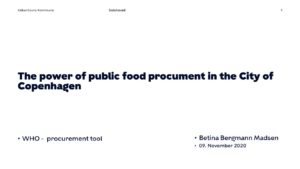
In Copenhagen, Denmark, the municipal authority took a strategic approach to the 1100 kitchens in the city preparing food for schools, retirement homes and day-care centres. Till that point each kitchen had planned and prepared their own supply, but the city procurement team was able to transform the whole system, across supply and demand, to provide healthy, sustainable, organic, locally produced meals. They used public procurement of food to contribute to other political goals of the municipality, including the reduction of packaging and of CO2 emissions.
In order to achieve these things, continuous market dialogue was and is essential: ‘you cannot just put a tender out there out of the blue and achieve this kind of thing’. The city used market dialogue to refine and improve their tender requirements, and to understand the opportunities to push the market further. They followed it with a ‘market monologue’, to confirm what they learned from that dialogue. By putting in place communication mechanisms between local suppliers and the kitchens they are serving, the city was also able to drive forwards policy goals around reducing waste and circularity of the food supply chain. The market dialogue also suggested allowing the supply of food which was almost expiring, which reduced waste along the supply chain. Seasonality was also an aim. Through two-way market dialogue, it became apparent that certain vegetables could not be supplied because of the risk small scale producers took on in initiating growing them and taking on new fields to do so. The latest tenders from the city now share this risk, enabling a supply of new seasonal vegetables to the city’s children and older people.
A partnership between French government and companies for social inclusive and sustainable public procurement
- Caroline Niemeier, Project Manager, Impact
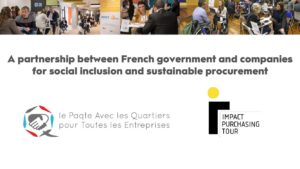
Impact Partners is an investment fund which is headquartered in Paris. In France a new pact was signed by President Macron which called on businesses to take part in the fight against unemployment and to involve companies in sustainable procurement processes. Today, 83 major groups and 1400 SMEs are already partnering with the French Public Investment Bank, Impact Partners and the French National Agency for Territorial Cohesion. One of their focuses is to mobilise both public buyers and buyers from big companies to undertake ‘solidarity sourcing’ approaches. As part of an ‘Impact Purchasing Tour’ 70 events were facilitated nationally to bring together 154 buyers with 145 social and local businesses. Of the 154 buyers, 62 are public buyers, including French ministries, regional and departmental councils, the Office of the Prime Minister, cities, metro police forces and many others. At each of the events, a speed dating method was applied, with each social and local business being linked up to at least 5 relevant major buyers. Such efforts can help to massively stimulate the trade between the most ethical or local businesses and government.
Market engagement as a tool to support the local economy: The case of school food procurement
- Luana Swensson, Policy Specialist for Public Procurement, Food and Agriculture Organization of the United Nations (FAO)
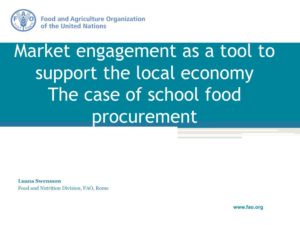
Food and Agriculture Organisation. Over the last few years there has been an increasing recognition amongst policy makers of the potential of public procurement to support local and smallholder agricultural production. Now bodies like the African Union, USAID and Latin American countries are using school feeding programmes to develop local and domestic agricultural production. Procurement can influence the types of food that gets produced, the types of producers, those who benefit from ownership of companies – for example women or young people, and the sustainability and diversity of food production. Procurement is a policy tool that can have multiple benefits for multiple beneficiary groups – small scale producers, local children eating more healthily, and the wider community doing so also – as more diverse, sustainable foodstuffs make their way out into private markets. Such programmes are having significant economic impacts – one study in Ethiopia for example showing that every $1 invested in home grown farming brings an economic return of $7.2, whilst regular farming investment only brings a return of $3.1. Another economic evaluation in Kenya found that an increase of 10% in purchasing from local farmers will lead to a 7% increase in the total real income for the community – in addition to the revenues that those farmers gain. Beyond this, the wider community gains an increased diversity in available food products, and there are productivity gains for the farms themselves, as their businesses develop, leading to a nearly tenfold increase in community income over time.
How procurement is done presents different types of challenges and benefits – very centralised forms have efficiency gains and the ability to collectivise public influence on the market, whereas highly decentralised forms can provide a closeness to the needs of local producers. One key challenge in some countries is that cooperative farm associations or small farms do not easily fit the definitions set within laws which aim to promote procurement from SMEs. So those market actors that need the support from public procurement, and who would benefit the wider local economies the most, are excluded for technical reasons.
Public procurement can be used as an essential and powerful tool to achieving wider sustainable development goals. However, the reality is that, in most countries, there is a disconnection between food procurement and the sustainable development agenda. There is a lack of dialogue between public procurement actors and other ministries and sustainable development actors in governments. The FAO is starting to address this by facilitating dialogues, producing materials, assessing where countries capacities are at, and providing training.
Breakout Session 3: Communicating with the market in the market exploration and contract management phases
This panel debate focused on communicating with the market at the market exploration and contract management phases. These are additional instruments that public entities have in their toolbox to promote sustainability goals. Contract management, as one of the participants noted, provides a flexible and ongoing way to promote continuous sustainability improvements in supply chains over time, rather than only during a tender process. Market exploration is a tool that can be used before tenders are put to market, and can be used to design a pathway towards the market meeting sustainability goals.
Contract management to drive up labour standards in international supply chains.
- Björn Claeson, Director, Electronics Watch
 This talk explored how public buyers can collectively articulate demands to improve conditions and how independent monitoring organisations such as Electronics Watch can support this process. Björn Claeson spoke from the perspective of an independent monitoring organisation who monitor labour rights and health and safety in electronics factories around the world. Public procurement demand is absolutely fundamental to drive forward improvements in factories around the world and facilitate successful collaborations with companies. This includes the safer use of chemicals, worker voice, wages and gender. As a network of more than 300 public buyers in 7 countries ranging from small towns, universities, hospitals, up to national governments and agencies, Electronics Watch is able to monitor electronics factories in 11 production countries. Affiliate members adopt contract conditions, through which public buyers can articulate the demand for decent working conditions. Electronics Watch then follows up on these conditions on their behalf. Electronics Watch monitors the very factories that assemble the products or that make the components for the products that the public authorities buy. They then work with the companies to address violations and improve social and working conditions.
This talk explored how public buyers can collectively articulate demands to improve conditions and how independent monitoring organisations such as Electronics Watch can support this process. Björn Claeson spoke from the perspective of an independent monitoring organisation who monitor labour rights and health and safety in electronics factories around the world. Public procurement demand is absolutely fundamental to drive forward improvements in factories around the world and facilitate successful collaborations with companies. This includes the safer use of chemicals, worker voice, wages and gender. As a network of more than 300 public buyers in 7 countries ranging from small towns, universities, hospitals, up to national governments and agencies, Electronics Watch is able to monitor electronics factories in 11 production countries. Affiliate members adopt contract conditions, through which public buyers can articulate the demand for decent working conditions. Electronics Watch then follows up on these conditions on their behalf. Electronics Watch monitors the very factories that assemble the products or that make the components for the products that the public authorities buy. They then work with the companies to address violations and improve social and working conditions.
Electronics Watch’s model contract conditions have been transposed to fit the legal requirements of public procurement law in a number of countries. When their affiliate members apply these performance conditions they then apply for the duration of the contracts. They include conditions such as that the contractor must exercise effective due diligence to achieve supply chain transparency and to seek to address risks and violations that are brought to their attention. And they have a responsibility to remediate violations, to provide reparations for victims, and to take action to prevent violations from recurring. In terms of supply chain transparency, successful tenders must disclose the factories where the products are produced or assembled. Collaboration and dialogue can also be a contractual requirement. Electronics Watch also undertakes proactive investigations and surveys of key production regions. This involves looking at certain factories that appear to be significant to the affiliate supply chain and where there is a known risk. They also react in response to worker complaints and analyse the evidence to check for violations of the code of conduct. The findings go into a report in the first instance to the companies themselves to initiate a dialogue between the company, the public entities buying from it, and Electronics Watch. This gives the companies a chance to study and address these violations. Companies are required to acknowledge the receipt of the report and should then investigate the findings and report back to Electronics Watch. This is followed by dialogue to discuss the remediation.
Market exploration to promote sustainability outcomes
- Christian Gusbeth, Referat ZIB11, Procurement Office of the Federal Ministry of the Interior
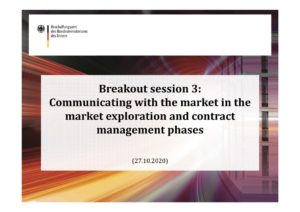
Germany. Christian Gusbeth clarified that in German procurement law there is explicit permission for market exploration. There is also a clear distinction between market exploration and the procurement process. With no further regulations regarding the selection of the participants for the market exploration, nor the process in general, this allows for a variety in processes, as long as they remain bound by the principles of procurement law (transparency, competition, equal treatment, and so on).
Undertaking market research helps the preparation of the procurement process and is a very useful tool for establishing a realistic basis for cost calculations. It allows an entity to check that there will be offers from the market. It facilitates the ability to implement feedback from participants prior to the publication of any calls for tender. Developing a framework agreement and a roadmap can help to ensure that transparency and market communication are increased. This includes building up online resources covering information about ongoing awarding procedures, types of products included or the services plan, start dates, running times, and calls for tenders resulting from previous evaluations of demand. This approach helps to ensure that entities can learn from demand evaluations and market explorations.
A framework agreement roadmap can also help to activate the market, secure resources within companies, and create opportunities for market participants to cooperate from an early stage in the procurement process. This helps to overcome the classic problem wherein companies give feedback at a time when it is no longer possible to act on or to integrate their suggestions. Thus, with early participation in the procurement process, it is possible to effectively counterbalance these ramifications. Improving transparency in the awarding process can be achieved with market dialogue or market explorations after a general invitation that allows all companies to participate in the process, if they wish. This provides companies with equal opportunities for participation, making it possible to provide early feedback and for them to learn from discussions about a service or product before publishing the call for tenders.
How contract management helped Region Stockholm become a European sustainability leader
- Kathleen McCaughey, Manager Sustainable Supply Chains, Region Stockholm
Sweden. Region Stockholm is responsible for providing health care, public transportation, and working with regional planning in the entire region surrounding the city of Stockholm. For 10 years, there has been collaboration and a shared code of conduct across in an attempt to harmonise demands. The region has identified a number of product- categories at high risk of breaches of human rights, workers’ rights, corruption, and to the environment. This helped to ensure efficient use of resources whilst giving each municipality responsibility for different areas.
Among the Swedish regions Stockholm took responsibility for establishing ways to procure ICT products, manufactured under conditions of social responsibility. This means creating an action plan of the risk categories for this sector, identifying where they are across the entire supply chain, from the minerals or raw materials being used, up to end of life, and then trying to harmonise this across all the municipalities. At the tender stage, they could then eliminate certain suppliers that were not able to show that they will live up to the contractual terms. Another tool was awarding extra points to reward tenders by bidders who show progress on these issues. In the contract management phase where non-compliances were found, the region would work together with suppliers on corrective actions. For example, in 2018 and 2019 the region had nine procurements in the ICT field. They wanted to introduce social criteria to complement their existing environmental criteria. To include this in the award criteria, the region undertook market dialogues before the procurements to clearly lay out their expectations and gather feedback from potential bidders.
A roundtable discussion with brands and suppliers was then convened, and suppliers could also book individual meetings. Suppliers were asked on how far they had come on social standards and how far they could realistically go. During the contract management phase, the dialogue continues. Whilst suppliers may have committed within the contract to respect labour rights, Region Stockholm’s auditor found that they were not fulfilling all the requirements. At that point the region worked with suppliers to address these concerns.
Wednesday, 28 October 2020
On the final day of the conference, the focus lay on the effects that procuring in purchasing groups and via joint procurement platforms can have on sustainable public procurement. In some countries, purchasing groups comprise a number of municipalities, universities or other public sector bodies that procure either infrequently or regularly together. Other countries have procurement platforms on a national level from which all public entities may order goods and services. There is a great deal of variety across sectors and among countries. Panellists and speakers from multiple continents shared experiences on the different available options for joint procurement. Public and private consulting institutions that advise on and help coordinate joint procurement initiatives also shared their knowledge.
Presentation on “What is joint procurement and how can we use it for sustainability? – Insights from German and selected European frontrunners”
What is joint procurement and how can we use it for sustainability? – Insights from German and selected European Frontrunners
- Maximilian Müngersdorff, German Development Institute / Deutsches Institut für Entwicklungspolitik (DIE)
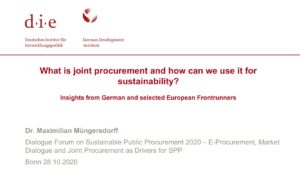
Maximilian Müngersdorff introduced the idea of joint public procurement, and defined it either as cooperative procurement, or collaborative organisations which cooperate on procurement. Joint procurement can expedite and benefit sustainable public procurement. Procurement groups with more money to spend make it more attractive for enterprises to change the way they undertake production. Joint procurement can also increase the availability of expertise, personnel and other resources. It can help municipalities overcome the complexities of SPP, can be the basis for integrating wider strategic goals around sustainability and innovation, and can enable a stronger focus on contract management.
Most public entities engage in joint procurement with objectives around acquiring better value for money and a less costly procurement process. Purchasing groups aim to gain new members or to purchase specific products. The four pillars of joint procurement initiatives are 1) collaboration around strategic objectives, both public entities and purchasing group objectives, 2) an agreed form of collaboration (such as a consortium or a one-off arrangement around a framework contract), 3) a collaboration process, such as defining the lead and the process of market engagement, and 4) collaboration performance – ensuring collaborations perform better than individual procurements.
The different forms of joint public procurement in Europe are 1) Joint procurement on a district level, 2) Loose joint procurement networks of cities, 3) Advanced joint procurement networks of cities – who procure collectively on a regular or integrated basis, 4) Central service providers for specific product groups, such as ICT for example, and 5) Supra-regional providers of procurement services, who may have their own framework contracts or e-catalogues. In Europe the Nordic countries, and some others such as Italy, have centralised procurement structures on the national level, such as Hansel in Finland or Consip in Italy.
There are few cases of deep integration on the regional level, a notable exception being the Austrian state of Vorarlberg. Finally, there are growing numbers of city networks, combining innovation and sustainability goals. One participant brought up the relative lack of examples of a sixth category, the ‘transnational joint public procurement’ – an interesting gap in best practice, given that states may share very similar objectives from SPP, for example combatting climate change through reforming supply chains, but do not usually combine their market influence across borders.
In summary, joint public procurement can achieve progress towards strategic and sustainable public procurement objectives but this is not automatically the case. More exchange of good practices between regions and countries is needed. To implement joint procurement, resources and support is needed – for example public sector advising institutions need more capacity and resources to consult and connect public entities in order to expedite progress.
Panel debate on “Experiences on how to establish joint procurement and how to build in sustainability aspects”
Panellists: Gisele Doetzer, Network Manager Sustenta Paraná, State of Paraná, Marion Götz, Steering Group Intercommunal Cooperation, City of Raunheim, Valentina Schippers-Opejko, Coordinator Urban Agenda Partnership on Innovative and Responsible Public Procurement, City of Haarlem
This panel debate introduced joint procurement as a theme, and participants from different countries and continents outlined how they had approached the issue.
Shared purchasing of Sustenta Paraná
- Gisele Doetzer, Network Manager Sustenta Paraná, State of Paraná
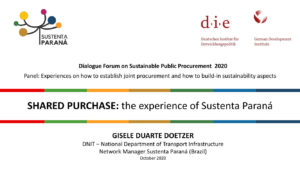
Brazil. Sustenta Paraná is made up of 18 institutions operating under a technical cooperation agreement. The 18 institutions jointly promote sustainability in public management. Amongst other forms of cooperation, they undertake joint procurement. Gisele Doetzer, Network Manager at Sustenta Paraná, outlined how successful institutions need good channels of communication, transparency and focus. To achieve this, institutions need to get out of their comfort zones and become more open to joint efforts, dialogue, and supporting each other. In turn that means developing institutions for benchmarking, using collective intelligence, and optimising the use of infrastructure and human resources. By working together this way, the institutions were able to overcome a number of issues they each faced: managers with work overload, unequal distribution of work across institutions, individuals having to do all of the price research and all of the system management. By working together, it was possible to plan tenders better and to work collaboratively to define tender specifications with sustainability criteria. This fostered greater levels of standardisation and led to savings of 38% across 22 items and the 16 participating institutions.
The experience of the district of Groß-Gerau, Germany, with joint procurement
- Marion Götz, Steering Group Intercommunal Cooperation, City of Raunheim
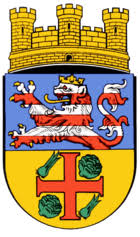 Germany. Marion Götz gives an insight into the inter-municipal cooperation of the cities, municipalities and the district of Groß-Gerau. An important topic is procurement management, which began through joint procurement management for paper and office materials in the district of Groß-Gerau, and has now led to a consensus that procurement management should be jointly organized on a larger scale. This realisation led to another project, with the objective to explore how to join forces in procurement in the future, even beyond paper and office supplies. Here, it was initially important to identify suitable procurement items and what financial and organisational advantages could result from this. Among other things, it was found that working time could be saved and expertise in legal and sustainability fields could be accumulated. In 2017, all of these aspects led to the development of a separate office to assist all departments within the district with procurement related matters: The procurement centre of the district of Groß-Gerau, combining a total of 10 cities and municipalities. The most important advantages that have resulted from this are considerable savings in labour, a high level of legal certainty due to the support of specialists, and the possibility of carrying out joint procurements. Here, the requirements are clarified in advance with all participating municipalities and purchases are made mutually as required.
Germany. Marion Götz gives an insight into the inter-municipal cooperation of the cities, municipalities and the district of Groß-Gerau. An important topic is procurement management, which began through joint procurement management for paper and office materials in the district of Groß-Gerau, and has now led to a consensus that procurement management should be jointly organized on a larger scale. This realisation led to another project, with the objective to explore how to join forces in procurement in the future, even beyond paper and office supplies. Here, it was initially important to identify suitable procurement items and what financial and organisational advantages could result from this. Among other things, it was found that working time could be saved and expertise in legal and sustainability fields could be accumulated. In 2017, all of these aspects led to the development of a separate office to assist all departments within the district with procurement related matters: The procurement centre of the district of Groß-Gerau, combining a total of 10 cities and municipalities. The most important advantages that have resulted from this are considerable savings in labour, a high level of legal certainty due to the support of specialists, and the possibility of carrying out joint procurements. Here, the requirements are clarified in advance with all participating municipalities and purchases are made mutually as required.
Through joint procurement, specialised knowledge on sustainability can be used and integrated by all. At the time of the launch, Dr. Wachowiak, an expert in the field of sustainable procurement (who also shared her expertise in the 2021 Dialogue Forum), was hired to integrate sustainability criteria into the tenders of the joint procurement group. Through these aspects, in addition to political decisions, the municipalities and cities were inspired to be more sustainable and critical in procurement procedures.
Focussing expertise in a central procuring unit makes it possible to integrate sustainability criteria more quickly on a broad scale.
‘Start small’: Pathways towards joint procurement
- Valentina Schippers-Opejko, Coordinator Urban Agenda Partnership on Innovative and Responsible Public Procurement, City of Haarlem
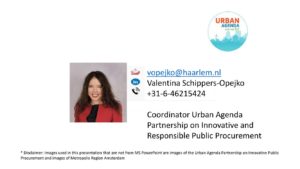
Netherlands. Valentina Schippers-Opejko, the coordinator of the Urban Agenda Partnership on Innovative and Responsible Public Procurement spoke about joint procurement with partners from different organisations, European cities, regions, and entire member states in Europe. She noted that the first thing you have to do to start a journey towards implementing sustainable public procurement is to search for inspiration, which will be different for each organisation. She also noted the benefits of starting small. For example, if an organisation decides to move towards circular production, it does not need to know in advance how to be completely circular. Taking those first small steps and then learning from them is key.
In the context of COVID-19 many public organisations believe that implementing sustainability or circular economy aspects is too difficult because of the need to procure under enormous time pressure. Valentina argued that it is possible to take small steps to find big solutions. For example, in the city of Haarlem, most of the public authorities are now required to buy protective screens for protecting workplaces to lower the risk of infection spreading. Normally, this would mean buying lots of plastic screens. But they thought differently and asked a different question. Instead of asking their market partners to deliver plastic screens, they formulated the question as a challenge, to stimulate innovation and creativity from the market. In response, one supplier came up with a solution to make screens from sheep’s wool. This meant it could be reused and washed.
Sustainable public procurement joint procurement in Finland
- Katriina Alhola, Senior researcher, Finnish Environment Institute and Centre for Sustainable Consumption and Production
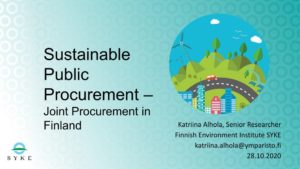
The Finnish Environment Institute and Centre for Sustainable Consumption and Production is one of the organizations working in the KEINO competence centre for sustainable and innovative public procurement in Finland. KEINO functions as a ‘network based’ competence centre – with members that include government-wide bodies and research institutes. In Finland, 35 billion Euro are spent on public procurement each year. KEINO competence centre organizes buyers’ groups that jointly develop public procurement practices on certain theme, such as low-carbon construction of low-emission traffic. There are also regional groups who procure together via frameworks, and groups of local organisations which co-operate in market dialogue and preparation of procurement. Finland’s central government procurement body Hansel has an ‘ecolabel’ accreditation of their own, which suppliers must gain to be a part of framework contracts. In order for prospective suppliers to receive this ecolabel they have to meet quite high environmental and social standards. Lower-level procurement groups at regional or municipal levels sometimes also require high social and environmental standards within their framework contracts. At the city or local level, there are also forms of joint procurement – a notable one being the Carbon Neutral Network of Cities. Facilitated by the Finnish Environment Institute, this network pooled resources to do market engagement. One example is a nationwide framework agreement for solar panels for all the cities that wished to join. In these joint procurements, the technical specifications are set by the lead organisation, after major consultations with the various players who will use the framework contract, and also through market dialogue. One exciting product of this work has been bringing together supply and demand of electric vehicles. Not only were the municipalities able to service their needs for large vehicles, but within the same procurements, to buy smaller electric cars which can be rented out by citizens when they need them – helping to promote a circular, ‘car as a service’ model within their areas.
An important learning from these processes has been that there is much to be gained from joint procurement. Framework contracts for joint procurement should be kept fairly simple in their subject matter, we were told, to facilitate high levels of engagement from different partner organisations.
The Big Buyers Initiative: How European collaboration is boosting the procurement of innovative solutions to achieve climate neutrality
- Rafael Hirt, Officer Sustainable Economy and Procurement, ICLEI -Local Governments for Sustainability
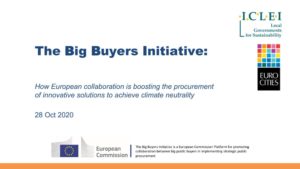
ICLEI – Local Governments for Sustainability. The Big Buyers Initiative, managed by ICLEI and Euro Cities and financed by the European Commission’s DG Grow fund, is a collaboration between big public buyers in Europe on strategic procurement to help drive the market for innovative goods and services. It aims to combine the purchasing power of individual public entities and reduce the cost of purchasing innovation. More and better organised public demand should help to scale up and expedite innovation. After a comprehensive needs assessment across the members of the two networks involved, three purchasing groups were formed aiming to purchase innovative solutions around three areas: zero emission construction sites, circular construction, and electric vehicles. The first group focussed on electric vehicles that were useful to public authorities – for example refuse trucks and street cleaning machines. Those that were already available on the market were expensive and low-performing compared to their diesel counterparts. Their charging infrastructure was expensive to roll out, battery supply was limited, and there were safety issues in the batteries that were available. There was also a lack of innovative financial service solutions that would enable public entities to safely borrow to invest in these new vehicles.
ICLEI and EuroCities organised market dialogue events, not only with major existing providers of electric vehicles and their accompanying infrastructure, but also including new providers, SMEs, and others who were interested or engaged in the sector. Working alongside the European Innovation Council, with a membership of 6000 of the most innovative companies in Europe, big and small, meant that a broad base of potential innovators was reached. The advantage of this European collaboration is that it builds capacity for market consultations and dialogues at the European level, enables buyers to share information on product availability, technical specifications, results and prices across Europe, to share tools and market engagement techniques and successful procurement criteria. It also combined purchasing power in order to drive wider change. The initiative is currently seeking public buyers to join their working groups on carbon-neutral and circular construction.
Bizob, Netherlands. The Netherlands has almost 90 municipalities and procurement spending for the whole public sector is about 73 billion Euro. There are a number of collaborative procurement organisations in the Netherlands, and around 38% of municipalities are members of such an organisation. 64% of municipalities are using joint procurement agreements or are members of structural collaborative procurement organisations. Bizob is a strategic partner of those collaborative procurement organisations, and the Bizob team works in the offices of those organisations and their member municipalities, rather than from a central office. This embedded approach achieves more than economies of scale, it also facilitates nationwide knowledge gathering, analysis, combined with local knowledge of markets and practical appreciation of the problems municipalities face in procurement.
Breakout session 2: Joint procurement on the national level – Insights from Africa, South America and Europe
This breakout session focused on national platforms for joint procurement with examples from Africa, South America, and Europe. Whilst these platforms exist all over the world and often do similar things, they are not always talking to each other or learning from one another. This session aimed to be a step towards achieving improved dialogue. It explored differences, similarities, and opportunities for shared learning.
Sustainable public procurement 2020: Strategic approach to public procurement
- Lidia Capparelli, Project Leader Procure2Innovate, Consip
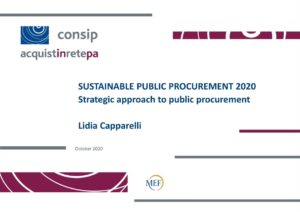
Italy. Lidia Capparelli is the Project Leader for Procure2Innovate within Consip, the Italian government body which organises public procurement. Through their procurement centre of almost 400 people, they spend around 14 billion Euro annually, with 5.5 billion Euro of this related to sustainability in 2019. They operate a system of mandatory requirements on sustainable procurement operating from decrees issued by the Ministry of Environment. Through collaboration with a large number of stakeholders, they work to define sustainability criteria for different product groups. Market dialogue is an important tool as the criteria defined at this stage are issued and become mandatory for all public authorities in Italy. Currently, their work relates to 20 product groups across different sectors including energy efficiency for buildings, lighting, public lights, streetlights, IT equipment, printed copy management and building tools and maintenance. This means that across a large number of sectors sustainability criteria are mandatory.
Implementing this approach was a long process. In 2017 the process of establishing these mandatory requirements was introduced into Consip’s framework agreements. They implemented this through the dynamic purchasing system and also into an electronic marketplace that included mandatory sustainability criteria. Requirements were made regarding certification labels or other specific criteria and ways were developed to verify responses in tender documents. This required a long period of asking the market to become compliant with the requirements. The successes of this approach would not have been possible without Consip’s country-wide aggregation of demand. Consip’s e-procurement platform has been the result of years of work. It is now used to contribute to the SDGs that they are targeting through their joint procurement procedures. This includes thinking about the links between raw materials and waste and recognizing the possibility of reusing materials in new, circular processes of production. In the future, Consip aims to promote innovation within the supplier base by including questions that refer to the functional outcomes of the tenders rather than describing pre-written technical specifications. In this way, they seek to ensure the procurement process is an integrated process where sustainability, innovation and circularity can be combined.
Transversal contracting and supplier development
- Reginald Clarke, Deputy Director LGSCM, Western Cape Government, Provincial Treasury
- Adele Eloff, Cape Town International Convention Centre
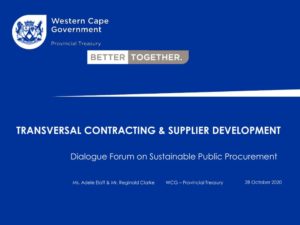
Cape Town – Africa. Reginald Clarke (Western Cape Government) and Adele Eloff (Cape Town International Convention Centre) also spoke about shared framework agreements through the lens of the local government supply chain management. They are collectively responsible for strategic sourcing and prompting innovation through procurement. Through the provision of guidance and support, training, and monitoring, they support procurement systems across the 30 municipalities within the Western Cape. Their public procurement strategy is based on the three pillars of economic development, social development, and environmentally sound development.
The Broad Based Black Economic Empowerment initiative is an approach to stimulate the participation of previously disadvantaged groups in the economy. Opportunities for female-owned businesses and support for youth unemployment programmes are also social aspects to be considered within public procurement in South Africa. This is achieved by procuring certain products and services from local manufacturers with a focus on particular regions in the Western Cape. Through a central supplier database consisting of over 16,000 suppliers, and 7,831 active suppliers, the success of these initiatives can be tracked. This includes looking at what commodities are being sold, which suppliers are receiving contracts, and what regions they are coming from. By exploring who is doing business with the government it is also easier to respond to the COVID-19 pandemic – for example by knowing how many masks are available in the region. Through a joint district approach (JDA) looking at regional and local economic development, and municipality spending, support and assistance packages are provided to bring more local suppliers to the government’s table.
Ecuador social inclusive eCatalog, a strategy to promote sustainable public procurement
- Andres Redin, Regional Advisor in Public Procurement, UNOPS
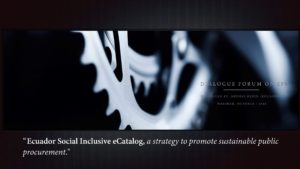
Ecuador. Andres Redin’s talk looked at Ecuador’s socially inclusive e-catalogue and strategies to promote sustainable public procurement. This initiative demonstrated the impact of promoting socially inclusive public procurement policies over the last seven years. The success of any national procurement project needs willingness and political support in order to be successful and achieve its desired results. In Ecuador, the constitution refers to the national development plan which is a multi-year government-wide approach. The key foci are social benefits, economic benefits, and environmental improvements to reduce impacts on the natural world, accounting respectively for 50, 40 and 10 percent of the award criteria. These outcomes remain the focus of the current national development plan running from 2017-2021.
The national public procurement system includes a set of principles, policies, regulations, and procedures along with other instruments to focus on planning, executing and controlling the uses of public funds, whilst accounting for the three overarching aims of improved social, economic, and environmental outcomes. The purchasing strategy also considers bundling demand as the mechanism best able to improve the effectiveness of public spending by public entities and to consolidate annual demand. This was expected to lead to better commercial conditions and increase the government’s leverage. The Public Procurement Agency was responsible for conducting both the procurement process and selecting or prequalifying suitable vendors that would be part of an e-catalogue. They also used a platform to receive purchase orders from vendors and buyers and manage these inclusively. One initiative involving the Ministry of Education was presented to illustrate how this system was used to provide school uniforms more efficiently (within 30 days), affordably, and securely for both the vendors and the buyers (paid within 20 days of delivery of goods). This approach involved more than 1,000 micro and small vendors and women’s associations being selected for projects totalling 15 million USD.
Breakout session 3: Joint Procurement initiatives of municipalities – Insights from European frontrunners
This breakout session explored joint procurement initiatives with examples of good practice from European frontrunners. The way that public procurement is organised differs widely across European countries. Whilst there are groups of municipalities that decide to join forces in procurement almost everywhere, such collaborations differ in numerous ways. This could be in relation to the duration of the collaboration or the products that they jointly purchase. To explore these differences, this session drew on some inspiring practical examples of joint and sustainable public procurement across Europe.
ÖkoBeschaffungsservice Vorarlberg (Ecological Procurement Service)
- Dietmar Lenz, Head of Procurement, Vorarlberg Association of Municipalities
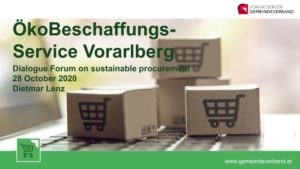
Dietmar Lenz from the Vorarlberg Association of Municipalities gives an insight into the ÖkoBeschaffungsservice (ÖBS) Vorarlberg.
Founded in 1992, the Operator environmental federation is an association (now a body of the Vorarlberg Association of Municipalities) that coordinates the environmental tasks and interests in all 96 municipalities in the Austrian federal state of Vorarlberg. Since then, the association has developed eco-guidelines, a web-shop and established the “ÖkoBeschaffungsService Vorarlberg, ÖBS” (Eco Procurement Service Vorarlberg) which is a regional procurement centre and has been expanded over the years.
The purchasing process through ÖBS Vorarlberg is as follows: The demand of public clients for standardised products is surveyed, and based on this, tender documents, bid evaluation, sampling and awards are prepared together with experts. Customers are registered in the Web-shop „ÖBS-Shop“, orders are placed there, and delivery and invoicing are carried out directly by the contractual partner. The user fee for shopping via ÖBS is 2.5% of the net annual turnover.
Expenses could be reduced by 23% and working hours spent on public procurement by 50%. In addition, ecological and other sustainable criteria in all products are very important, which led to a high saving of emissions.
The regional added value amounted to 80-90% of contractors from Vorarlberg. In addition, legal certainty was secured due to the expertise of the central procurement office.
The service is used voluntarily by approx. 250 public clients, with increasing demand. This is owed to the participative approach, the proximity to customers and the win-win situation between sustainability and economic benefits.
Municipal networks driving innovation and sustainability within a region
- Valentina Schippers-Opejko, Coordinator Urban Agenda Partnership on Innovative and Responsible Public Procurement, City of Haarlem
The City of Haarlem has profound experiences with sustainable and innovative procurement through the Urban Agenda Partnership activities in the field of joint procurement. This included working with the European Agenda partnership and the Metropole Region of Amsterdam (MRA). The Urban Agenda partnership started with just a few members but in just three years has become a very large partnership with numerous partners, experts, and organisations now involved and continued organisational growth. During this time, they have built a procurement strategy for 7 products driving sustainability and innovation in the purchasing process. These actions included developing strategies, collaborating with knowledge centres and innovative procurement brokers, securing future funding and keep track of spending, designing legal frameworks, and expanding circular procurement. These actions allow European cities to push forward public procurement as a strategic policy tool. The Urban Agenda also offers an e-learning module for people interested in learning more about how to approach joint procurement.
The MRA includes 35 members, 33 municipalities around Amsterdam, two provinces, and one transport organisation. The collaboration began in 2018 and developed a roadmap to achieve increasing levels of circularity in procurement. The aim was to move from 10% circularity in 2022 to 50% by 2025 and 100% circularity by 2030. This roadmap clearly describes the kinds of approaches public entities can take when trying to develop more circular procurement practices. The MRA has worked towards increasing circularity in the procurement of products including roads signage, asphalt, paving products, paving concrete, office interiors, furniture and products for catering. A list of relevant award and selection criteria such as minimising the use of plastic packaging or making smaller portion sizes to reduce food waste in the catering industry, was compiled for the different products. Expertise and guidance were shared between small and large organisations. This process was successful mainly because of the participation of key change makers who could provide their experience and expertise. The enthusiasm of these change makers was a key driver for success as they pushed circularity and sustainability forward in their organisations – creating a snowball effect. A crucial success factor was also support and commitment of politicians, directors, managers, and budget holders who understood, that when public procurement is used as a strategic tool, it can help to solve key environmental, ecological, economic, and social challenges.
Urban agenda partnership on innovative and responsible public procurement
- Marta Wachowiak, Coordination of Municipal Development Policy, District of Groß-Gerau
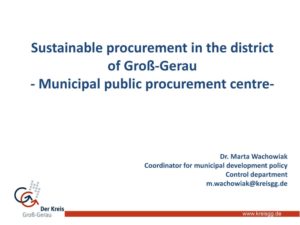
District of Groß-Gerau – Germany. Marta Wachowiak presented the municipal procurement centre of the district of Groß-Gerau, which consists of 14 municipalities and was founded in 2017. The aim of the municipal procurement centre is to carry out many joint procurements in order to simplify the process for the municipalities. The municipalities can also carry out individual procurements via the centre, if no other member wishes to join. A working group on sustainable development meets regularly with the Heads of Department to speak about any planned procurements and how sustainability could be implemented in the process. They also developed a roadmap to/for the most important procurements taking place in the district administration.
Marta Wachowiak emphasised the importance of communication to get all staff members on board with the idea of sustainable procurement. In order to achieve this, they regularly publish content in the internal magazine and conduct training sessions with staff. Both trainees and the management level are obliged to attend the trainings.
In the meantime, they not only managed to set up a filter for social and environmental criteria in their e-catalogue so that environmentally friendly products are listed first. They also developed a strategy in reference to the 2030 Agenda on how to use only durable and environmentally friendly products by 2030 and beyond. The county council officially adopted this strategy in 2020.


Schreibe einen Kommentar